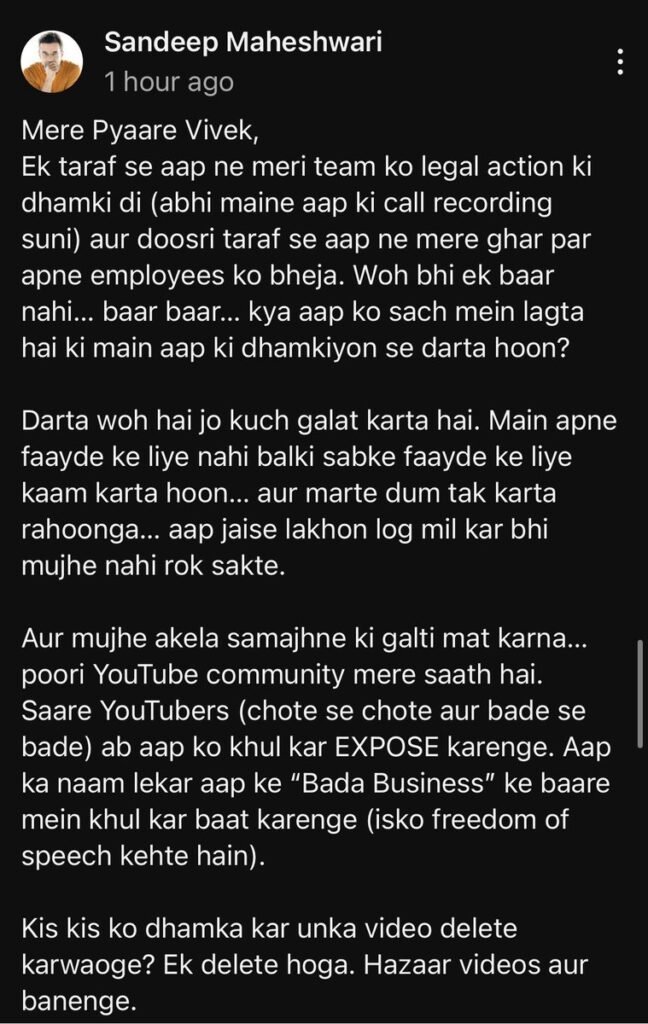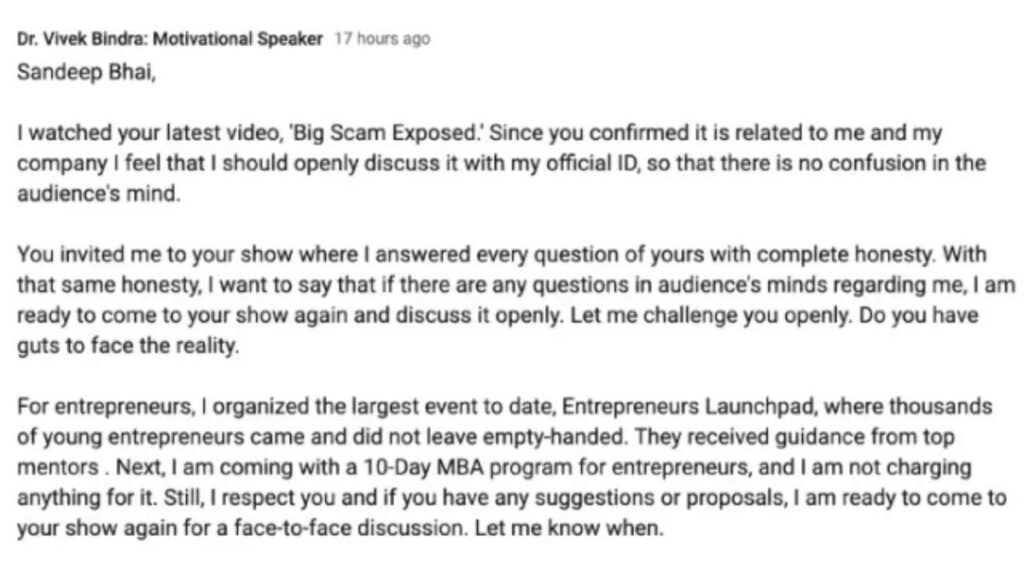Introduction:
The recent clash between two titans of the online business coaching realm, Sandeep Maheshwari vs Vivek Bindra, has erupted into a full-blown controversy. The allegations of scams and subsequent legal actions have brought the underlying issues of ethics, transparency, and business model effectiveness to the forefront of discussions Sandeep Maheshwari vs Vivek Bindra within the online community.
Table of Contents
The Scam Unveiled:
At the epicenter of the controversy is a video where an aggrieved student narrates their experience of purchasing a course from a prominent YouTuber, strongly hinted to be Vivek Bindra. The student contends that the promised value of the course was not delivered, and attempts to secure a refund were met with resistance. The situation escalated when Vivek Bindra’s legal team issued a notice to Sandeep Maheshwari, confirming their association with the allegations.
Understanding the Business Model:
Vivek Bindra’s business coaching model was designed around creating a nationwide network of Independent Business Consultants (IBCs) to disseminate his courses. The model’s core flaw, as revealed by the controversy, lay in the selection of IBCs. Success was contingent on these consultants possessing a nuanced understanding of business intricacies, a criterion that was not consistently met.
The IBC Selection Error:
The controversy sheds light on the critical error in the selection of IBCs. The Independent Business Consultants were expected to be well-versed in business, yet the criteria for their selection appeared flawed. The controversy suggests that individuals with questionable ethics and limited business understanding were recruited, leading to potential scams and a breach of trust.
Lessons from the Controversy:
- Vigilant Selection of Business Coaches: Consumers are urged to exercise due diligence in scrutinizing the credentials and ethical standards of business coaches before investing in their courses. A comprehensive research approach can act as a safeguard against falling victim to scams.
- Transparency and Accountability: The controversy underscores the paramount importance of transparency in business dealings. Business coaches must not only make promises but be accountable for delivering on them. A lack of transparency can erode trust, as demonstrated by this controversy.
- Importance of Ethical Business Practices: The central theme emerging from this controversy is the significance of ethical business practices. Coaches must prioritize delivering genuine value to their customers rather than solely focusing on profits. Ethical practices not only build trust but also safeguard the reputation of the entire industry.
Sandeep Maheshwari’s Stand:
In the midst of the controversy, Sandeep Maheshwari’s response and stance hold immense significance. How he navigates the situation and addresses the allegations will not only impact his personal reputation but will also set a precedent for ethical conduct within the industry.

Vivek Bindra’s Response to Sandeep Maheshwari:
In a recent statement, Vivek Bindra has broken his silence on the controversy with Sandeep Maheshwari, expressing contentment that Maheshwari has acknowledged that the contentious video titled “Big Scam Exposed” was indeed directed at him. Bindra has taken the opportunity to challenge Maheshwari, inviting him to host a face-to-face discussion on his show. This move is aimed at addressing and clarifying doubts while testing Maheshwari’s willingness to confront the reality of the situation. It sets the stage for a potentially heated dialogue, highlighting the desire for transparency and resolution in the midst of the ongoing controversy.

Conclusion to Sandeep Maheshwari vs Vivek Bindra

The Sandeep Maheshwari vs Vivek Bindra controversy serves as a cautionary tale within the business coaching industry. As consumers, it is imperative to exercise discernment and caution when navigating the landscape of online courses. This controversy is a stark reminder that success in the industry is not solely dependent on profits but on ethical practices, transparency, and delivering real value to customers. As the dust settles, the industry must collectively introspect and take measures to ensure that the trust of consumers is not only restored but strengthened, fostering a culture of accountability and authenticity within online business coaching.
This controversy should serve as a catalyst for positive change, prompting a collective reevaluation of industry practices. It emphasizes the need for stringent measures in selecting individuals who represent and sell these courses. Moving forward, business coaches should prioritize transparency, accountability, and the genuine delivery of value to their clients. The aftermath of this controversy presents an opportunity for the industry to strengthen its foundations, rebuild trust, and instill confidence in the countless individuals seeking guidance and education in the online business coaching realm.

